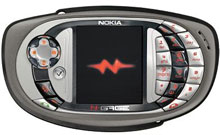You've probably been hearing a lot about podcasting, a kind of mix of RSS technology, pirate-radio sensibilities, and iPod portability. Steve Jobs even announced that the next version of iTunes will support podcasting. But what the heck is podcasting, and how can you get in on the action?
In short, a podcast is MP3 audio content, such as a radio show or an audio blog, that is distributed through RSS feeds. You can subscribe to these feeds as with any other RSS content. New podcasts are automatically downloaded and added to your favorite player software or portable MP3 player without your having to lift a finger. Because these free-form audio broadcasts are distributed on the Internet, they fly well outside the reach of radio's regulation and broadcasting licenses. Thus, the content is completely free in every sense of the word.
In the current climate of media consolidation and content crackdowns, podcasting scratches an itch for users looking for inventive, challenging, or just plain different audio content. With its no-holds-barred approach and home-brewed distribution methods, podcasting upsets the very medium that inspired it. Oh, and it's terribly addictive.
The first program to take advantage of the cross-pollination of technologies was an open-source project called iPodder.NET, created by Adam Curry, one of the original MTV veejays. Since the program's inception, developers have built on Curry's invention, creating new and exciting ways to discover, listen to, create, and aggregate podcasts all over the Internet.
We particularly like iPodder, which comes with all the necessary tools for seeking out and downloading podcasts. Some of its exemplary features include a healthy directory of podcasts, links to specialized podcasting software, and handy filters to keep you from downloading outdated podcasts. The program organizes content with tabs for downloads, subscriptions, and a podcast directory, as well as a cleanup tab for keeping your playlists tidy. We also appreciate that the program is available for Windows, Mac OS X, and Linux systems.
Think of a podcast as an audio blog. The content is completely free-form. Whether you're obsessed with tube socks or social justice, at least one other person online shares your passion. You can record your rambles in most audio programs, but many applications focus specifically on recording and publishing podcasts. One of our favorites is Propaganda. This handsomely designed program features multitrack recording, some hokey sound effects and transitions, a gorgeous arrangement window, and plenty of tools for exporting your show. The simplified step-by-step process makes it easier to tackle the more technically advanced elements of podcasting, such as the creation of the XML files RSS requires.
Source:www.download.com
